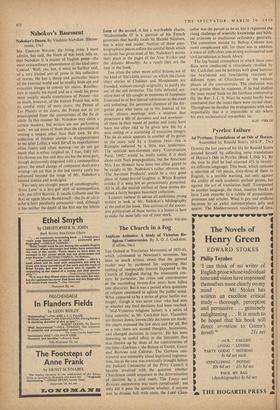Nabokov's Basement
Nabokov's Dozen. By Vladimir Nabokov. (Heine- mann, 15s.)
MR. EDMUND WILSON, the living critic I most admire, has said, the blurb of this book tells us, that Nabokov is 'a master of English prose—the most extraordinary phenomenon of the kind since Conrad.' Well, yes; but, it must be 'further said, of a very limited sort of prose in this collection of stories. He has a sharp and particular vision of the external world and he readily finds apt and evocative images to convey his vision. Recollec- tion is usually his mood and as a result his prose most usually recalls translations of Proust—not so much, however, of the mature Proust but, with its careful array of mots juges, the Proust of Les Plaisirs et les Jours, the Proust not as yet emancipated from the conventions of the fin de siècle. In this manner Mr. Nabokov may claim a certain mastery, but writers are not performing seals: we ask more of them than the cleverness of writing a tongue other than their own. In this collection of thirteen stories—a disappointment to me after Lolita, a work for all its imperfections often funny and often moving—we do not get much that is either original or, I fear, fully felt. His themes are few and they are for the most part, though dexterously disguised with a cosmopolitan glitter, the small change of competent short-story writing—an art that in the last twenty years has advanced beyond the range of Mr. Nabokov's limited ironies and nostalgias.
Two only are straight pieces of autobiography. 'First Love' is a boy-girl idyll of cosmopolitan, rich, pre-1914 Biarritz. It recalls Gilberte and the Bois or again Marie Bashkirtseff—the fin de siecle echo is here peculiarly persuasive—and, although it has neither the depth of the first nor the febrile force of the second, it has a worthwhile charm. 'Mademoiselle 0' is a portrait of his French governess that hardly rivals Sir Harold Nicolson, but is witty and tender. Neither of these auto- biographical pieces suffers the careful finish which no doubt has given most of Mr. Nabokov's stories their place in the pages of the New Yorker and the Atlantic Monthly. As a result they are the best in the book.
Too often the other more artful fictions are of the kind of 'life's little ironies' on which the classic short stories of Chekhov and Maupassant are founded, without enough originality to justify the use of the old formulas. The little defeated sen- sitive men of life caught in moments of happiness frustrated or of bewildered submission to the cruel and unfeeling; the perennial chestnut of the for- gotten poet who turns up at the festival of his work; chance meetings with a mistress that punctuate a life of devotion and end nowhere— all these in their mood of pathos and irony have been too often told to be given new life by a neat ending or a scattering of evocative images. The fin de siècle appears in another of its guises in the story told by a Siamese twin—this is
Richepin softened by a little wan tenderness. The satirical anti-German story 'Conversation
Piece, 1945,' would be really comic if it dealt
alone with Nazi propagandists, but the American Mrs. Leo Hunters have been too often guyed to be caught in Mr. Nabokov's rather obvious net.
The Assistant Producer' would be a very good piece of funny-horrid laughter at White Russian crooks if it were not so pretentiously presented. All in all, the modish surface of these stories dis- guises a fairly bargain basement collection.
I cannot forbear to advise all ambitious young writers to look at Mr. Nabokov's bibliography at the end of the book. This account of the succes- sive publication of these stories is a lesson in how to make the most lolly out of your work.
ANGUS WILSON


































 Previous page
Previous page